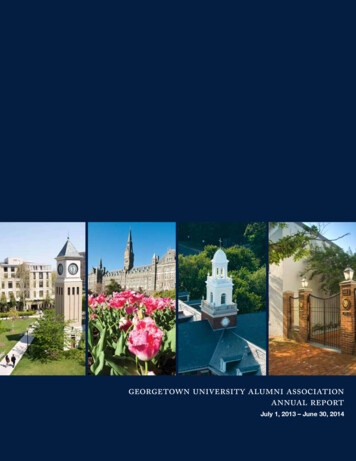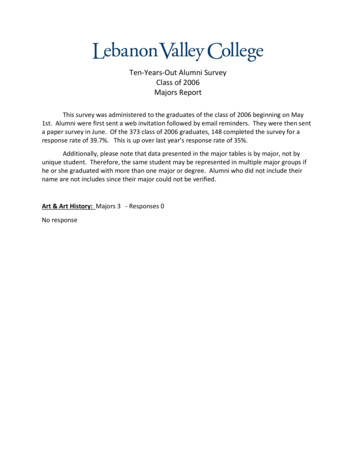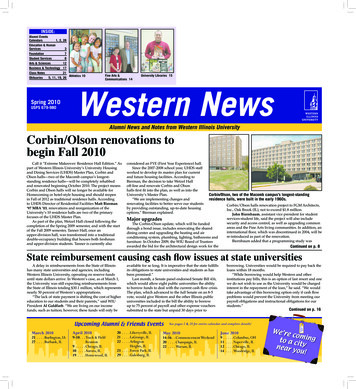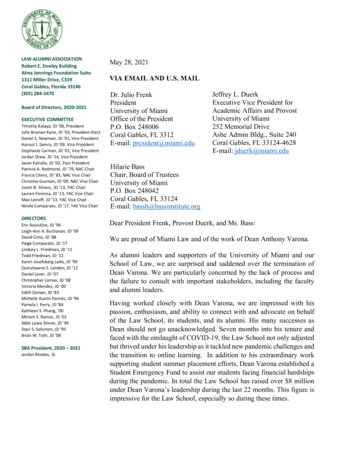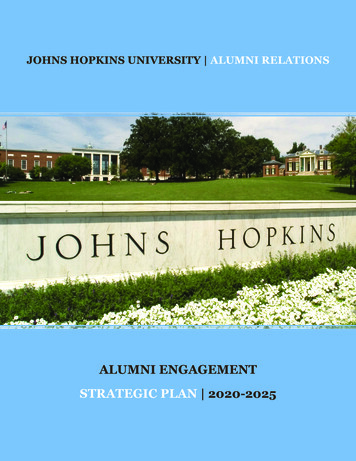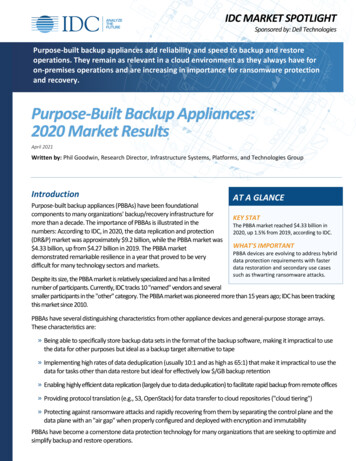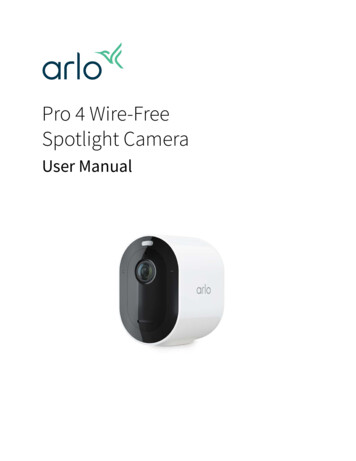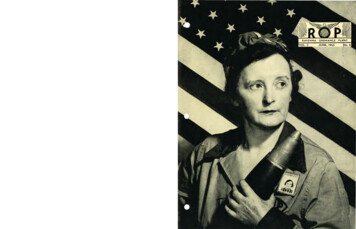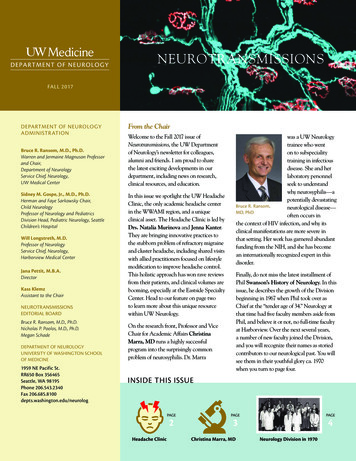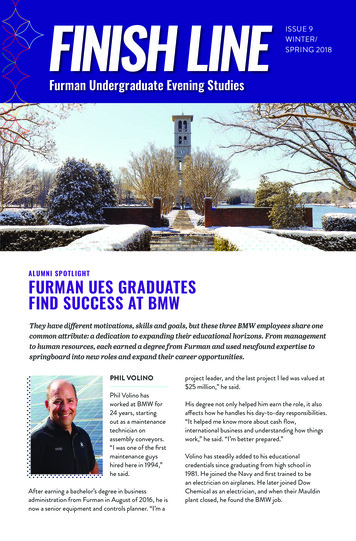
Transcription
ISSUE 9WINTER/SPRING 2018Furman Undergraduate Evening StudiesALUMNI SP O T LIGH TFURMAN UES GRADUATESFIND SUCCESS AT BMWThey have different motivations, skills and goals, but these three BMW employees share onecommon attribute: a dedication to expanding their educational horizons. From managementto human resources, each earned a degree from Furman and used newfound expertise tospringboard into new roles and expand their career opportunities.PHIL VOLINOPhil Volino hasworked at BMW for24 years, startingout as a maintenancetechnician onassembly conveyors.“I was one of the firstmaintenance guyshired here in 1994,”he said.After earning a bachelor’s degree in businessadministration from Furman in August of 2016, he isnow a senior equipment and controls planner. “I’m aproject leader, and the last project I led was valued at 25 million,” he said.His degree not only helped him earn the role, it alsoaffects how he handles his day-to-day responsibilities.“It helped me know more about cash flow,international business and understanding how thingswork,” he said. “I’m better prepared.”Volino has steadily added to his educationalcredentials since graduating from high school in1981. He joined the Navy and first trained to bean electrician on airplanes. He later joined DowChemical as an electrician, and when their Mauldinplant closed, he found the BMW job.
Around the same time that he joined BMW,he completed his associate’s degree in electronicengineering at Greenville Technical College andwent on to complete another associate’s degreein automotive technology from SpartanburgCommunity College in 1997. “My job keptgrowing faster and I needed to keep up,” he said.“I want to keep my value highand have options for what Iwant to do. I might eventuallyteach or consult.”The speed of growth at BMW offered manyopportunities to advance, and he wanted to keepgrowing along with the company. As he tookon more engineering projects and worked withdifferent cultures, he came across UndergraduateEvening Studies at Furman and realized it would bethe ideal next step. “I could learn about business,culture and international business. I felt like, ifI’m going to put the time in, I wanted it to meansomething, and Furman meant the most.”During his seven years at Furman, he was struckby the quality of his fellow students “and howmuch I learned from them.”In his continuing quest for knowledge, Volino iscurrently completing his MBA at Clemson. “Thebottom line is lifelong learning,” he said. “I want tokeep my value high and have options for what I wantto do. I might eventually teach or consult.”He is grateful that Furman, BMW and his familyoffered him so much support along the way.“It was difficult, but I’m glad to have taken theopportunity,” he said.PAUL SINANIANPaul Sinanian ’14,a manager of totalvehicle validationat BMW, earneda bachelor’s inaccounting fromFurman for adifferent reasonthan most. “I did itto relax,” he said.2“I enjoy learning and I went back to school to shutmy phone off and pay attention.”FACULT Y FOCUSSinanian earned a bachelor’s degree in mechanicalengineering straight out of high school beforejoining Bosch as a manufacturing and developmentengineer. He also earned an MBA from Clemson.After seven years, he joined BMW as a productvalidation engineer before moving into hismanager role.After 20 Years, Chidester Took a Second Shot at Her Childhood DreamsWhen he began at Furman, he had been inmanagement for two years and wanted to learnadditional managerial techniques. “I looked at everyteacher as a manager of the class,” he said.Since his undergraduate degree was in engineering,he appreciated the liberal arts aspects of Furman.“It opened up different avenues to think about,” hesaid. “I enjoyed being in a collaborative environmentthat isn’t like work.”He valued the diversity in his classes and groupprojects that allowed him to understand differentperspectives. His favorite class was StrategicManagement taught by John Meindl. “It reallyconnected all the dots, and transformed the wayI manage and teach at work,” he said. “I use ateaching perspective more than a path-orientedmanagerial perspective. If you align vision,mission and strategy, you can build somethingthat’s not target-based or transaction-based, buttransformational.”“I enjoyed being in acollaborative environmentthat isn’t like work.”As he continues to collect degrees, his next stepis likely a master’s degree in teaching, and hisexperience at Furman reconfirmed his desire topursue the field.“I’ve always been a defender of people who go toschool at night,” he said. “It’s impressive and quitemotivating. There are some smart people in theseclasses working really hard. It’s uplifting to seepeople working that hard, and seeing the rewards isquite nice as well.”continued on page 5NEVER TOO LATEToday, Dianne Chidester is a respectedinstructor in anthropology and sociologyat Greenville Technical College and FurmanUndergraduate Evening Studies. However, 40years ago, she was flunking out of college.“I was a first-generation college student, and Iwasn’t ready,” she said. Overwhelmed and underprepared, she dropped out, moved from Ohio toNorth Carolina and took a job as a secretary forsurgeon Dr. Erle Peacock. She later became officemanager and worked there for two decades.Over the years, she considered returning to collegefor her degree. “I gave it a shot a couple of times,”she said, “but life gets in the way.”Inspiration arrived when Dr. Peacock, who foundedthe UNC Division of Plastic and ReconstructiveSurgery and the UNC Hand Rehabilitation Center,decided to retire from medicine and go to lawschool.“That left me without a job,” Chidester said.Dr. Peacock encouraged her to go to college, butshe told him she had already tried that and it hadn’tgone well. He implored her to take a couple ofclasses at a community college and “see howit goes.”Once she began, she was forced to select a major.“I thought it didn’t make any difference what Imajored in,” Chidester said. “I just wanted a degreeso I could get another office job. When I was a kid, Iwanted to be an archaeologist, and you could majorin anthropology at Alamance Community College,so I said I would do that.”She eventually earned her bachelor’s degree inanthropology from UNC Greensboro in 1994 atthe age of 42, and by then, she had realized thatthe office life was not for her after all. All theseyears later, she still wanted to be an anthropologist.“I wanted to teach at a community college andreach out to non-traditional students because ofmy own experience,” she said.By Leigh Savage,Contributing WriterTo pursue that dream,she earned a master’sdegree in anthropologyfrom the University ofSouth Carolina, andwas able to assist on anarcheological project inWestern Mexico. Beinghired at USC helped herfall in love with teaching.“I like explaining things, DIANNE CHIDESTERand I love anthropology,”she said. “There are always new discoveries comingout, new ideas.”After stints teaching at the University of SouthDakota and a community college in Kentucky,she joined the faculty at Greenville Tech in 2005,teaching anthropology and sociology. She foundthat some community colleges offer anthropologyinfrequently or not at all, so she earned 24 credithours in sociology - “almost a master’s,” she said so she can teach those courses as well.In 2007, she became an adjunct professor atFurman in UES, and enjoys teaching Furmanstudents, many of whom are earning degrees inbusiness or accounting. “Cultural anthropologyis important for people going into business,” shesaid. “The work is international, multinational. Theyneed to learn how to stand back and see why thingshappen, how things happen to a culture. It’s culturalrelativism, and they need good analytical skills.”While she values both of her jobs, she finds thatstudents at Greenville Tech tend to vary morewidely, where one class might have a 14-year-oldand a 65-year-old. Furman students “are reallydetermined, work hard and bring life experiencesto the discussion,” she said. “Many of them haveinternational experiences as well, which enhancesthe classroom experience.”Her 20 years in the workplace added value to whatshe brought to the classroom. Many of her studentsare in the same boat, bringing skills, determinationand understanding that they didn’t have at 18.continued on next page3
QUALITY MATTERSDuring the past year, Furman University joined Quality Matters (QM), an organization thatprovides a best practice rubric and training opportunities for ensuring the quality of blendedand online courses. Four of our evening studies professors participated in the Quality Mattersprogram. Upon completion of the program, they will each receive the QM Teaching Onlinecertificate. Participating in the program were David Johnson (business), McCrady Gwinn(accounting), Elizabeth Gordon (chemistry) and Marian Osborne-Berky (religion). A generousdesignated gift to Undergraduate Evening Studies made the Quality Matters program possiblefor these instructors.The certificate curriculum included in-depth study of the following topics relevant toinstructional delivery of content: Evaluating your institutional policies: (2 weeks)Evaluating your course design (2 weeks)Orienting your online learners (1 week)Connecting learning theories to your teaching strategies (2 weeks)Gauging your technology Skills (1 week)Creating presence in online classroom (2 week)Assessing your learners (1 week)According to participant Elizabeth Gordon, she saw the following results from thecertificate program: A more comprehensive understanding of Furman’s policiesA better idea of the resources and effort required to design an effective online courseNew teaching strategies, particularly around the topics of scaffolding and accessibilityMore disciplined time management of the courseNever Too Latecontinued from page 3Chidester’s life has taken many twists and turns over her 65 years. She said it proves John Lennon’s pointabout life happening when you are busy making other plans. She is glad she was open to making changes andhopes she can inspire her students to do the same.She’s also grateful to Dr. Peacock, now deceased, for showing her that it is never too late to pursue yourinterests. After decades as a surgeon, he went on to have a law practice for 15 years.Furman UES Graduates Find Success at BMWcontinued from page 2ELLE COHENElle Cohen beganat BMW workingon the line asa productionassociate. After sixyears, she movedinto a supervisorrole, but what trulyinterested her washuman resources.She had earnedan associate’s degree in business management atGreenville Tech, but when she checked job postingsat BMW, every human resources job required afour-year degree. “I was ineligible,” she said. “I knewif I wanted to further my career, I had to go backto school.”“I had been passed over withno bachelor’s degree, and Iwas discouraged about themissed opportunities,” saidElle Cohen, who worked atBMW for 16 years beforeearning her degree in 2016.“Now I feel empowered. I onlywish I had done it earlier.”As Furman is a private university, she wasconcerned about price but quickly saw thatUES tuition was comparable to other schoolsin the Upstate. With BMW’s tuition assistance,“It was very affordable.”Working toward her bachelor’s degree in 2012 wasa difficult decision. “That same year, we adopted achild,” said Cohen, who already had four childrenages 12 through 19 at the time. “I took a semesteroff to get things situated with the new baby, but Iwas trying my best not to stop,” she said. “If youtake a break, it’s hard to get motivated to go back.The staff at Furman were very supportive.”She valued the way Furman offered help alongthe way, including a tutoring program that allowedstudents who excelled in certain areas to help otherstudents who were struggling. “I took advantage ofthat in several classes,” Cohen said. “I did that withprobability and statistics, and I ended up makingan A.”Another perk of the program was the staff,including an advisor who helped her when shebecame discouraged by all the years she waitedbefore pursuing her dream. “He told me that rightout of high school, I wasn’t prepared mentally, butnow I realized the importance of education and I’mnot wasting my money,” she said. “It was one of therealest things anyone told me. A lot of people waitand have to mature first.”She enjoyed meeting students from different walksof life and different industries, from an executive atFluor to a gas station owner.One year after completing her degree in 2016,Cohen noticed a human resources position listedon BMW’s website. This time, when she saw thatthe job, associate relations professional, requireda bachelor’s degree, she was proud to send in herapplication, and she got the job.“I think it’s a great fit,” she said. “If I decide totake another position, I would want a higherposition in human resources.” Cohen says shedaily applies the skill learned through her degree,particularly organizational behavior, managementand communication. “That really resonates in thehuman resources role,” she said. “People are yournumber one resource, and to sustain the business,you have to make sure people feel gratified whenthey come to work.”“It took me a long time to get here,” she said. “I didn’t think I was smart enough or had the resources, but Ifinally did what I said I wanted to do when I was a kid.”45
CONGRATULATIONSDATA DRIVENAnalytics Help Companies Boost Efficiency and Maximize Profitsby Leigh Savage, Contributing WriterData analytics, according to Wikipedia,is the process of collecting and inspectingdata to find useful information, suggestconclusions and aid in decision-making. Whilebusinesses have been collecting and examiningdata for centuries, technological innovations haveopened up a whole new world of data and newavenues for business optimization.“I don’t think it’s complicated,” said PhilCorbett, manager of marketing analyticsand communications at IBM and a strategicconsultant with Undergraduate Evening Studies(UES). “Analytics is fundamentally about askingquestions, and with the right questions, you canget answers from your data.”Technological advances have led to the“democratization of data,” he said, so that anyonecan find loads of information related to his or herbusiness. “It’s no longer one guy with a spreadsheetand thick glasses. Data is available at anyone’sfingertips.”Using software and specialized analytics systems,companies can find untapped markets, improvemarketing messages, increase efficiency andcustomer satisfaction. Transaction data is just onepiece of the puzzle, with businesses now able touse online sources such as clickstream data, socialmedia posts, phone records, web servers and evendata captured by household items like AmazonAlexa and Google Home.“That’s the internet of things,” Corbett said,referring to devices and machines that can transferdata without human participation. “All sorts of datacomes in, so the issue becomes, how do we manageit, organize it and get something out of it?”One reason data analytics is such an importanttopic is that it can be applied to all aspects ofbusiness, from marketing and human resources tofinance and supply chain.Jeff Diaz ’06, CIO at SJWD Water District inSpartanburg and an adjunct professor in FurmanUndergraduate Evening Studies (UES), said hisapproach is taking “what seems to be loosely6correlating information and turning that intoknowledge that we can take action on. It’s takingdata and using it to make decisions that drive thebusiness forward.”As a utility company, one of the largest costs atSJWD is pumping large volumes of water acrossvast spaces. According to Diaz, keeping thecompany’s power bill as low as possible leads tolower rates for customers. “The actual pumpscollect data such as the temperature of the motorand voltage irregularities,” he said. This informationallows staff members to make decisions about howbest to distribute water as well as when to maintainor replace equipment.SJWD uses an algorithm designed by the U.S.Department of Energy to analyze data inputs.In addition to keeping power consumption andrelated costs down, the system also cuts capitalexpenditures, as pumps can cost more than 500,000. “It helps get that ROI,” he said.MAXIMIZING DATAWith so much data coming in so many forms,including video, social media, and websites,the challenge according to Corbett is hiringpeople who can process and analyze that data.Understanding a programming language such asPython helps people extract the data, and furthertraining allows people to understand the data onceit is extracted.Data starts in a straight-forward descriptive form.“This is spreadsheets or data visualizing,” he said.“Visualizing data is the key enabler for anyone whowants to analyze data.”Once the data has described a situation, it canthen become diagnostic. If descriptive datashows that sales were down in May, diagnosticlooks into why the sales were down in May. Themore advanced stage, said Corbett, is predictiveanalytics, when multiple data sources can beused to predict certain outcomes. A prescriptiveanalysis then takes the information a step further,showing what businesses can do to optimize profits.TO THE FALL 2017 UES DEAN’S LISTFurman UES Dean’s List achievement is awarded to students who are enrolled in sixor more credit hours and earn a grade point average of at least 3.4 during a semester.Geoffrey S AllenJennifer B CoteHelen ReynoldsCatherine C AvinanteDiana K GodwinSusan M SimmonsDevin G BerlinChristopher G HaleySydney TownsendJennifer C BoboJason N MendezJoshua S WhiteLauren S CanadyRobert W PappasKatlyn A ClarkChristopher A ReynoldsDiaz has witnessed data analysis evolve from amore theoretical approach, when most businessesdidn’t have the processing power or storagecapacity to successfully gather and analyze largesets of data, to a more practical tool for businessestoday. Even the smallest businesses can benefit tosome degree.For example, a small restaurant may use data tofind out the best times to order food and beveragesto prevent spoilage and maximize savings. “Theycould find out how weather affects sales and whatpeople choose to eat. That helps you plan yourorders and stock your pantry,” Diaz said.George Manteghi completed his business degreeat Furman in 2008 and is now a senior buyerat biotech conglomerate Lonza. Using data forsupply chain management is a key area of focus forManteghi. “We use the numbers to paint a pictureof what we are trying to accomplish with our supplychain, such as on-time delivery. We can play withthe numbers,” to optimize efficiencies, he said.Recent advances have allowed companies to do “awhole lot more with less,” he said. He uses SAPsoftware, employing an algorithm that showswhen purchases must be made to prevent stockshortages. “We’re dealing with data that managesmillions of dollars’ worth of inventory, so we don’twant to buy too much or too little,” he said.While the technology is helpful, Manteghi said itis pivotal for companies to have employees whocan decipher what the numbers are saying. Hesees companies striving to become more nimble,accomplishing in a week what used to take amonth. Companies “need robust systems to lookat the data, finding shortcuts to make decisions,because time is money.”Diaz added that data analytics is the future ofoperations management, as “everyone is beingasked to do more with less. It’s about usingbusiness and management acumen to define visionand then using these analytic platforms to deliver.”“The fundamental common denominator is criticalthinking and common sense,” Corbett said. “If youask the right questions, the data will be there.”Furman’s Data Analytics Certificate sets youapart in a competitive, relevant and growing field.Our program will give you the academic foundationand real-world experiences to develop yourexpertise in collecting, interpreting and makingsound decisions from data. Employers across allindustries are seeking those who possess thisin-demand skill set. Now’s the time to dive in todata and advance your career!Contact us today for more informationat furman.edu/ues or 864.294.3141.7
UES SCHOLARSHIPS MAKE A DIFFERENCEEvery year many students struggle financiallyto achieve their Furman education. For manystudents, financial aid and scholarships are thesingle greatest factor contributing to their ability toattend and graduate from Furman.This year, thanks to the generosity of a donation of 10,000 from Sharon and Leonard Lee in 2017,UES can help even more students with financialassistance. As Furman alumna who took many ofher courses in Undergraduate Evening Studies,Sharon understands the financial challenges thatworking adults face when making the decision toenroll in college later in life, and wants to designatea gift that would alleviate some of the burden.In addition to this newest scholarship, UES alsoawards students from these endowed funds:MARK YOUR CALENDAR*In 2016–17 academic year, UES awarded a total of 19,200 in scholarships to ten students.March 19. Summer schedule releasedJune 1. Fall schedule releasedMarch 23. Spring Block C withdrawal deadlineJune 4. Summer term beginsMarch 30–. Easter holiday break forApril 1Block C courses ONLYJune 11, by 5 p.m. Add/Drop DeadlineApril 11. Spring Block B withdrawal deadlineJuly 1. Fall term registration opensApril 15. Summer admissionapplication deadlineJuly 2–4. Independence Day: No classesUndergraduate Evening Studies scholarships areavailable each semester to returning students whodemonstrate strong academic ability and financialneed. Students wishing to apply for a scholarshipcan download the application from the Costs andFinancial Aid section of the UES website at furman.edu/ues. The Jack Dickey Scholarship—open to juniors andseniors with demonstrated financial need and highacademic achievementThe 2017–2018 scholarship application deadlinesare: The Dr. Grace Hill Scholarship—an annual awardto one UES student with demonstrated financialneed and a GPA of 3.0 or higher August 6, 2018 for the fall semester The Hazel Long Smith ’41 Scholarship—awardedto students with demonstrated financial needUES welcomes gifts at all levels.To give, please visit furman.edu/giveChoose “Other” to designate “Undergraduate EveningStudies” By choosing “Other,” you may restrictyour gift to a particular fund (for example, UES:Gig Meredith fund or UES: Educational Excellenceoperational fund)Contributions, large or small, make a big differenceto hardworking students who juggle manycompeting financial obligations as they strive toimprove their lives. UES is actively seeking togrow the Frances Selby “Gig” Meredith fund to8an endowment level ( 10,000). Currently the GigMeredith Award recognizes an outstanding UESgraduating senior each year and is publicly awardedto the student at Furman’s annual Academic AwardBanquet. Once the fund becomes endowed, it willalso provide recipients with a scholarship award. May 1, 2018 for the summer term December 17, 2018 for the spring semesterApril 16. Summer registration opensApril 25–May 1. Block C final examsApril 30–May 2. Block B final examsMay 3, Noon. Instructor final grade deadlinefor graduating seniorsMay 4. Instructor final grade deadlinefor non-graduating studentsMay 4. UES Commencement CelebrationMay 5. CommencementMay 8. Spring final grades accessible tostudents in MyFurmanMay 16. Summer registration deadlineJuly 1. Fall admission application deadlineJuly 16, by 5 p.m. Summer term withdrawal deadlineAugust 1. Fall registration deadlineAugust 2–8. Summer term final examsAugust 10, noon. Instructor final grade deadlineAugust 11. CommencementAugust 14. Summer final grades availablein MyFurmanAug 20. UES Fall semester beginsSept. 3. Labor Day: No classes, offices closedSept. 5–19. Entry period for UES Art Exhibition*Dates subject to change. Current information availableat calendar.furman.edu9
UES ART EXHIBIT“VARIOUS SELVES: IDENTITY & IDENTITIES”See the entire exhibit at scholarexchange.furman.edu/ues-exhibits10Clockwise from far left: Erin Albrecht, Student; You Don’t Know Me. Raven Ostlind, (‘16); CombatVeterans. Tiffiny Murphy, (‘16); Grounded. Sam Tisdale, Staff; Ode to Zhaoming Wu. Ashton Cartee,(‘16); A Tale of Two Vdubs. Dr. Scott Murr, Faculty; Refracted.11
12Address Service RequestedFurman UniversityUndergraduate Evening Studies3300 Poinsett HighwayGreenville, South Carolina 29613-1507Non-Profit OrgU.S. PostagePAIDGreenville, SCPermit No. 1460
Greenville Tech, but when she checked job postings at BMW, every human resources job required a four-year degree. “I was ineligible,” she said. “I knew if I wanted to further my career, I had to go back to school.” As Furman is a private unive
